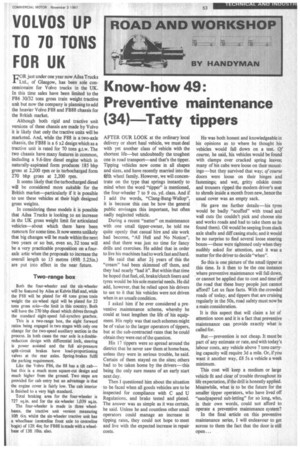Know-how 49: Preventive maintenance (34) Tatty tippers
Page 55

If you've noticed an error in this article please click here to report it so we can fix it.
AFTER OUR LOOK at the ordinary local delivery or short haul vehicle, we must deal with yet another class of vehicle with the shortest life—but undoubtedly the toughest one in road transport—and that's the tipper. Tipping vehicles now come in all shapes and sizes, and have recently married into the fifth wheel family. However, we will concentrate on the type that springs instantly to mind when the word "tipper" is mentioned, the four-wheeler 7 to 9 Cu. yd. class. And if I add the words, "Clang-Bang-Wallop", it is because this can be how the general public envisages this important, but often sadly neglected vehicle.
During a recent "natter" on maintenance with one small tipper-owner, he told me quite openly that casual hire and site work had become, -All Hell and No Notion", and that there was just no time for fancy drills and exercises. He added that in order to live his machines had to work fast and hard.
He said that after 2+ years of this the "cream" had been skimmed off them, and they had nearly "had it". But within that time he hoped that fuel, oil, brake/clutch liners and tyres would be his sole material needs. He did add, however, that he relied upon his drivers to see to it that his vehicles were not driven when in an unsafe condition.
I asked him if he ever considered a preventive maintenance scheme, whereby he could at least lengthen the life of his equipment. His reply was that such schemes might be of value to the larger operators of tippers, but at the sub-contracted rates that he could obtain they were out of the question.
His 17 tippers were so spread around the district that he never saw them at home base, unless they were in serious trouble, he said. Certain of them stayed on the sites; others had to be taken home by the drivers—this being the only sure means of an early start next day.
Then I questioned him about the situation to be faced when all goods vehicles are to be inspected for compliance with C and U Regulations, and brake tested and plated. The answer was as simple as it was certain, he said. Unless he and countless other small operators could manage an increase in tipping rates, they could not hope to meet and live with the expected increase in repair costs. He was both honest and knowledgeable in his opinions as to where he thought his vehicles would fall down on a test. Of course, he said, his vehicles would be found with clamps over cracked spring leaves; many of his cabs were loose on their mountings—but they survived that way; of course doors were loose on their hinges and fastenings; and wet, gritty oilskin coats and trousers ripped the modern driver's seat to shreds inside a month from new, hence the usual cover was an empty sack.
He gave me further details—his tyres would be badly "scuffed" with tread and wall cuts (he couldn't pick and choose site and works roads and had to take them as he found them). Oil would be seeping from slack axle shafts and diff casing studs; and it would be no surprise to find several loose steering boxes—these were tightened only when they audibly asked for attention, and it was a matter for the driver to decide "when".
So this is one picture of the small tipper at this time. Is it then to be the one instance where preventive maintenance will fall down, or cannot be applied due to cost and time off the road that these busy people just cannot afford? Let us face facts. With the crowded roads of today, and tippers that are cruising regularly in the 50s. road safety must now be a main consideration.
It is this aspect that will claim a lot of attention soon and it is a fact that preventive maintenance can provide exactly what is called for.
But—prevention is not cheap. It must be part of any estimate or rate, and with today's labour costs, any vehicle above 7 tons carrying capacity will require 3d a mile. Or, if you want it another way, £.8 5s a vehicle a week minimum.
This cost will keep a medium or large vehicle fit and clear of trouble throughout its life expectation, if the drill is honestly applied. Meanwhile, what is to be the future for the smaller tipper operators, who have lived off "sandpapered sub-letting" for so long, who, in their own words, could not afford to operate a preventive maintenance system?
In the final article on this preventive maintenance series, I will endeavour to get across to them the fact that the door is still open ...








































































































































